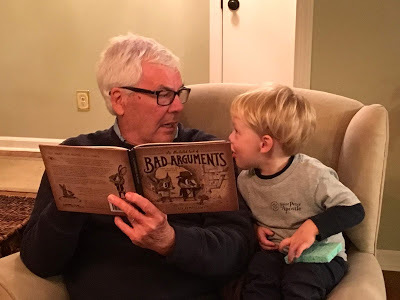Mamas Don't Let Your Babies Grow Up to be Uncritical Thinkers
 Me & Nico...just a couple of critical thinkers
Me & Nico...just a couple of critical thinkersSomeone recently posed this question on the Internet: If you had the power, what course would you introduce into American public schools? It took me a nanosecond to answer: Critical Thinking.The picture above of Grandson Nico and me reading from a book entitled An Illustrated Book of Bad Arguments is from a recent visit with Daughter Gillian’s family. The book is from their home library, and when I first laid eyes on it I was excited at the thought that there was a children’s book for detecting logical fallacies, a key skill in critical thinking. As I started reading it to Nico (his knowing expression notwithstanding), I realized that it wasn’t a children’s book at all. There may be children’s books for teaching logical fallacies per se, but this is not one of them. As the book states on page 1, “…it is aimed at newcomers to the field of logical reasoning, particularly those who…are so made that they understand best through visuals.” In other words, the book is for adults who prefer to learn as children do, through illustration. And though the illustrations in this book may appeal to children, the text is really for adults. That would eliminate it as source material if I ever got my wish to have critical thinking added to the core curricula of schools everywhere.Not a problem. Source material for teaching critical thinking to children abounds. There is hardly a children’s story ever written that does not lend itself to a lesson in critical thinking. That is, if there are adults willing to take the time to teach the lessons. Take Snow White for instance. A parent/teacher can use it to discuss diversity in the workplace, taking things from strangers, waiting for a prince to come...all by simply asking questions. What do the names of the seven dwarves tell us about them? If people in your family had names that told us about them, what would they be? Would you rather go to a school where everyone was a "Happy", or would you rather go to a school where there were "Docs" and "Dopeys"? Should Snow White have taken the apple from the stranger? Why do strangers sometimes offer to give things to children? What should you do when a stranger gives you something? Can a prince really bring someone back to life with a kiss? What is make-believe? Is make-believe a good thing or a bad thing? A questioning mind is the key weapon in defending against logical fallacies…and children are walking, talking question boxes. A young boy is the only one in the kingdom to question The Emperor’s New Clothes. A young girl is the only one in the land of Oz to question the wizard’s wizardry. These popular fictional heroes memorably exercise their critical thinking facilities as most children do—naturally by asking questions. No training required. In early childhood, children are full of wonder at how the world works. But that wonder often manifests itself in constant questioning and challenges to authority that get badly labeled as something like “the terrible twos.” Parents specifically and adults in general see the questioning stage as stage for their child to grow out of or be trained out of. This overwhelming need to “domesticate” children and turn them into docile vessels for received “wisdom” (aka the values, prejudices, and learning residue of their parents’ past) then becomes the operating mission of our public school system.We give lip service to the time-honored Socratic system of teaching through questioning, but we undercut it in practice by turning education into a mad scramble for “achievement”, which is just a euphemism for test results that show mastery of pre-packaged answers. We do this for the sake of efficiency and homogeny. Encouraging children to raise unexpected questions rather than regurgitate force-fed answers creates an unpredictable curriculum that conflicts with the primary goal of adult society--orderliness. Therein lies the fundamental contradiction in American education: should we place a higher value on critical thinking or uncritical acceptance of the thinking of others? Do we want to produce citizens who challenge authority, disrupt presumption, and resist bamboozelment? Or do we want citizens who respect authority, conform to established norms, and reject criticism? All the evidence from our child-rearing practices and educational methods points to the latter choice. Yet, there is ubiquitous evidence that this is the wrong choice. This is the choice that leads to our abysmally low voter turnout….the choice that leads to passive acceptance of forever wars…the choice that leads to a consumer culture that is constantly vulnerable to scams and exploitation.It is unlikely that American public schools will ever embrace a core curriculum that emphasizes critical thinking…even though it would enliven rather than anesthetize students and even though society would benefit from it in the end. But parents can send their children off to school armed with the skills and attitude required to asking good questions and thus effect change from below. The first and most crucial step would be to use their reading time with their kids to stir their children's minds rather than dull them to sleep. I understand the allure for harried parents to use bedtime reading to put their children to sleep, but the long-term harm of this habit seems severe. It’s positively Pavlovian…putting children to sleep at the sound of the written word creates a life-long response to reading as a soporific. Conscientious and visionary parents should be doing all they can to reverse this process by using reading time to stir their children’s imaginations and encourage their natural instinct for questioning.If they still need something to help get their kids to sleep, they can try sitting them in front of CSPAN or a nice recording of Tibetan bowls.
Published on January 11, 2019 12:23
No comments have been added yet.



